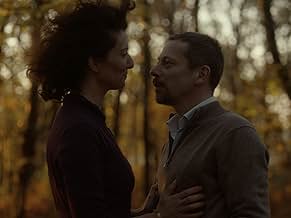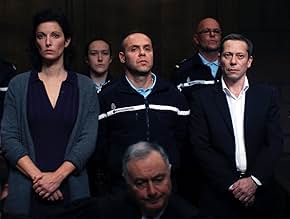IMDb RATING
6.3/10
3.9K
YOUR RATING
In their blue hotel room, a clandestine couple of two married lovers plan an impossible future, as death shutters their already frail tranquillity. Now, the noose tightens more and more arou... Read allIn their blue hotel room, a clandestine couple of two married lovers plan an impossible future, as death shutters their already frail tranquillity. Now, the noose tightens more and more around innocents and sinners; but, was there a crime?In their blue hotel room, a clandestine couple of two married lovers plan an impossible future, as death shutters their already frail tranquillity. Now, the noose tightens more and more around innocents and sinners; but, was there a crime?
- Director
- Writers
- Stars
- Awards
- 1 win & 5 nominations total
- Director
- Writers
- All cast & crew
- Production, box office & more at IMDbPro
Featured reviews
This is really quite a simple story. Man has affair with other man's wife. Has wife and family but re-unites with woman he met before his marriage. They have a series of trysts. She has a husband who has a serious medical condition and one day he dies. Unfortunately, the woman is a pharmacist and it appears that they have done a "Postman Always Rings Twice" murder. The whole thing focuses on a bewildered man who realizes that his actions have a consequence. He's not even sure what has happened as he sits in a courtroom. Sometimes justice is less about criminal justice and more about moral justice. A slow moving psychological drama based on a George Simenon novel.
The Blue Room is a French crime drama based on a novel of the same name by Georges Simenon and is directed by the lead actor, Mathieu Amalric. The film opens up in what is later revealed to be a flashback where the main character, Julien (played by Amalric), a married man, recalls his sexual experience with a woman (played by Stephanie Cleau) in a hotel room to the police. Julien is being accused of a crime that he doesn't apparently know anything about. As the film continues, and we go further and further into the story, we find out what actually did happen between this man and woman, as well as, the relationship between this man and his wife, eventually leading to a court case.
The movie's most interesting elements are its story structure, told in flashback, and its use of its musical score. One of my favorite scenes concerns Julien trying to burn some papers and they slowly vanish into the darkness of the ocean. The way this scene is filmed and framed, being intentionally slow, made it very interesting from a filmmaking standpoint.
The musical score is often bombastic, and scenes that aren't really meant to be dramatic carried a melodramatic theme. The score itself goes through different phases, from the very dramatic, to the mysterious, scary and even intimidating. The best use of the score in the film is during a court scene where we see people doing various things all at once. The background piano music fits the theme of this scene particularly well.
This film has good acting from its lead actors and lovely cinematography. If you like stories of adultery and crime, you will not be disappointed, however I found that the film wasn't particularly memorable or anything special overall.
The movie's most interesting elements are its story structure, told in flashback, and its use of its musical score. One of my favorite scenes concerns Julien trying to burn some papers and they slowly vanish into the darkness of the ocean. The way this scene is filmed and framed, being intentionally slow, made it very interesting from a filmmaking standpoint.
The musical score is often bombastic, and scenes that aren't really meant to be dramatic carried a melodramatic theme. The score itself goes through different phases, from the very dramatic, to the mysterious, scary and even intimidating. The best use of the score in the film is during a court scene where we see people doing various things all at once. The background piano music fits the theme of this scene particularly well.
This film has good acting from its lead actors and lovely cinematography. If you like stories of adultery and crime, you will not be disappointed, however I found that the film wasn't particularly memorable or anything special overall.
not an ordinary adaptation. the spirit of many contemporary French films. Mathieu Amalric using same tools to build his character. a Simenon in different manner. a cold film about relationship and decisions, about guilty and events who has a strange touching manner to surprise the viewer not for evolution of events but for the attitudes of characters. a film of silence and guilty out of facts. because it preserves the Greek mark of destiny, the poetry of things, the emotions as a kind of fog. nothing clear, each detail as part of a sort of ambiguity and slow rhythm of events. a film with a specific target who could seems be boring for many. but useful with few drops of patience. and with a crumb of interest for Simenon universe.
about desire. about the role of the other. about flesh and love and hidden by yourself sins, about the search of yourself and about the fall of a night.about justice. a film who mix, in wise manner, the seduction with fascination. a work of beauty and dark secrets and images of victims and fragile intentions. it could be the film of Mathieu Amalric. like many of his films because he has the science and the gift to propose the right solution for the tone of story. because it is a film of details, about a not special event, in which the states of characters remains the only significant thing. so, a film who must see. for the acting first. then, for atmosphere.
Slow moving (although only 76 minutes long), starting in the middle of confusion and sexual passion, and only very gradually revealing exactly what the central mystery being examined even is. All we know is that middle-class Julien (expertly played by director Amalric) and sexy, cold and intense Esther (the excellent Stephanie Cleau) have tremendous sexual chemistry, if not much real emotion between them. They are both married to other people, and we soon learn something awful has happened that has caused Julien to be under intense questioning by the police. All the other details are only revealed bit by bit as the story jumps around through a fractured time-scape.
Amalric uses the camera to underline and echo elements of the tricky construction, using odd, disquieting close ups that give us only a bit of the big picture, or pulling back to beautifully framed but distant feeling wider shots that give us the geography, but don't let us inside. The performances too – both by the leads and all the supporting characters – also serve the style. They're all dense and meticulously detailed, but it's up to us to figure out what those subtle details of behavior mean. Is that glance a look of love? Desire? Contempt? Does Julien's lawyer believe him? Does Julien's wife suspect or not?
If ultimately this adaptation of a Georges Simenon piece isn't quite as powerful as it's opening leads one to hope, it's still a smart, chilling and impressive directorial effort for Amalric.
Amalric uses the camera to underline and echo elements of the tricky construction, using odd, disquieting close ups that give us only a bit of the big picture, or pulling back to beautifully framed but distant feeling wider shots that give us the geography, but don't let us inside. The performances too – both by the leads and all the supporting characters – also serve the style. They're all dense and meticulously detailed, but it's up to us to figure out what those subtle details of behavior mean. Is that glance a look of love? Desire? Contempt? Does Julien's lawyer believe him? Does Julien's wife suspect or not?
If ultimately this adaptation of a Georges Simenon piece isn't quite as powerful as it's opening leads one to hope, it's still a smart, chilling and impressive directorial effort for Amalric.
Did you know
- TriviaFirst and, as of 2023, only film appearance for Mona Jaffart.
- Alternate versionsRemake of the Spanish-language film "The Blue Room" (original title: La habitación azul), 2002.
- ConnectionsReferences Pacific Rim (2013)
- SoundtracksChaconne - Partita for Violin No.2 (BWV 1004)
Written by Johann Sebastian Bach (as Bach)
Transcribed for piano by Ferruccio Busoni (as Busoni)
Performed by Itamar Golan
- How long is The Blue Room?Powered by Alexa
Details
- Release date
- Country of origin
- Official sites
- Language
- Also known as
- El cuarto azul
- Filming locations
- Les Sables-d'Olonne, Vendée, France(vacations by the sea)
- Production companies
- See more company credits at IMDbPro
Box office
- Gross US & Canada
- $254,666
- Opening weekend US & Canada
- $21,809
- Oct 5, 2014
- Gross worldwide
- $1,232,900
- Runtime
- 1h 16m(76 min)
- Color
- Sound mix
- Aspect ratio
- 1.33 : 1
Contribute to this page
Suggest an edit or add missing content






























